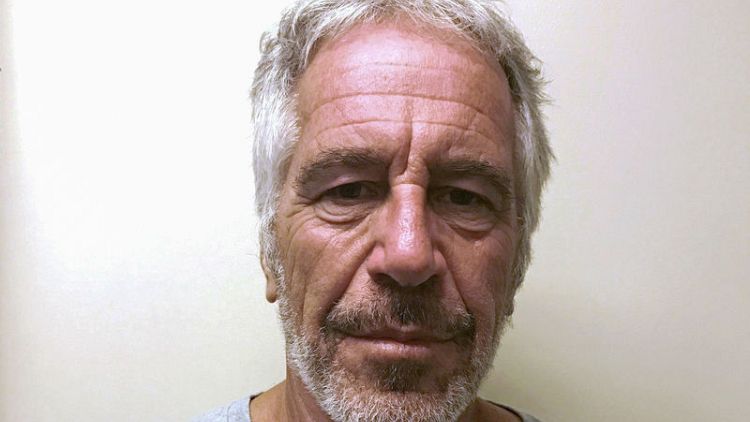By Karen Freifeld and Brendan Pierson
NEW YORK (Reuters) - A New York woman who said she was sexually assaulted by Jeffrey Epstein at the age of 14 sued the disgraced financier's estate and a former associate on Wednesday, in the start of an expected wave of lawsuits.
Jennifer Araoz, 32, said in her complaint that she was starting out in high school when an Epstein associate brought her to the financier's massive mansion on Manhattan's Upper East Side, beginning a grooming process that led to months of sexual abuse, including what she called a "brutal rape."
The lawsuit in New York County Supreme Court among the first of a series by women made possible by the state's Child Victims Act, which opens a one-year window to sue over alleged sexual abuse regardless of how long ago it occurred.
Epstein, who once counted Republican President Donald Trump and Democratic former President Bill Clinton as friends, died at age 66 on Saturday.
He had been found unresponsive in his cell at the Metropolitan Correctional Center in lower Manhattan, after having apparently hanged himself, according to federal prison authorities.
Epstein had been arrested on July 6 and pleaded not guilty to charges of sex trafficking involving dozens of underage girls between 2002 and 2005. Prosecutors said he recruited girls to give him massages, which became sexual in nature.
Araoz's lawsuit also targets former Epstein associate Ghislaine Maxwell, saying she facilitated Epstein's abuse of several girls by overseeing their recruitment and "ensuring that approximately three girls a day were made available to him for his sexual pleasure."
A lawyer who had represented Epstein did not immediately respond to requests for comment. Lawyers for Maxwell did not immediately respond to similar requests.
'HEAVEN'
The complaint described Epstein's massage room as having a ceiling painted as a blue sky with clouds and angels, "to give the appearance that you were in heaven."
It also detailed a variety of alleged misconduct by Epstein toward Araoz, including what she called an insinuation that she owed him because of the money he paid her.
"I take care of you, you take care of me," the complaint quoted Epstein as saying.
In 2008, Epstein had pleaded guilty in Florida to state charges of solicitation of prostitution from a minor in a non-prosecution agreement with federal prosecutors that has been widely criticized as too lenient.
The U.S. Attorney in Miami at the time, Alexander Acosta, resigned as U.S. labor secretary in July as that agreement came under fresh scrutiny following Epstein's latest arrest.
Epstein had been on suicide watch since the arrest but a source familiar with the matter who spoke on condition of anonymity said he was not on watch at the time of his death.
U.S. Attorney General William Barr on Tuesday ordered the transfer of Epstein's jail warden, after condemning "serious irregularities" at the facility. Two guards were placed on leave.
Barr also said the criminal investigation into Epstein's alleged sex trafficking and the role of possible co-conspirators would continue.
Trump has called for an investigation into Epstein's death.
It is not known if Epstein had a will. His lawyers last month said Epstein had about $559 million of assets, including two private islands and four homes, and that the Manhattan mansion was worth about $77 million.
Los Angeles lawyer Lisa Bloom and New York lawyer Roberta Kaplan told Reuters this past weekend that they intend to file lawsuits in New York against the estate this week.
Kaplan represents a woman described in the criminal indictment against Epstein as an underage victim. The indictment said the woman was recruited to engage in sex acts with Epstein around 2002, when she was 14, and paid hundreds of dollars for each encounter with the financier.
Bloom told Reuters she hoped the estate's assets would not be distributed until victims' claims were resolved, and that she would seek a court order to prevent that if necessary.
To obtain damages in civil lawsuits against the estate, victims would need to prove their claims by a preponderance of the evidence, not beyond a reasonable doubt as in a criminal case.
(Reporting by Karen Freifeld and Brendan Pierson in New York, additional reporting by Gabriella Borter; Editing by Noeleen Walder and Bill Trott)
